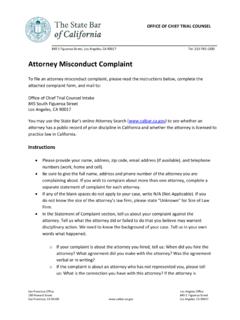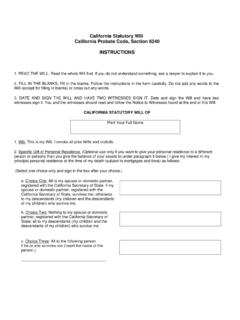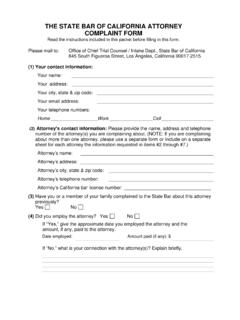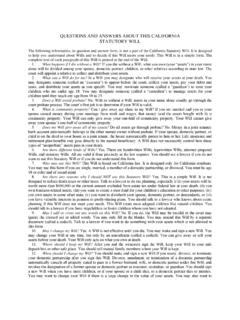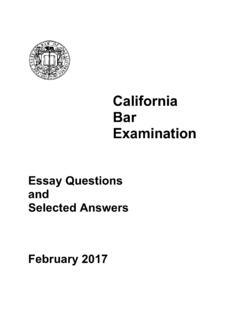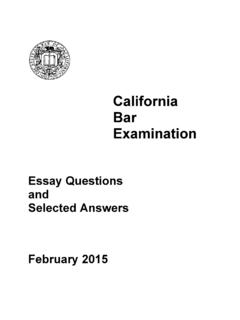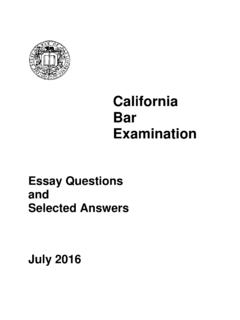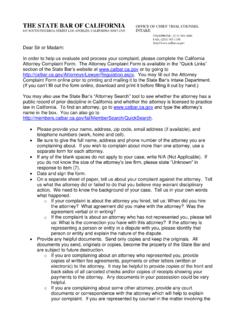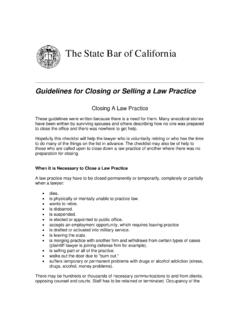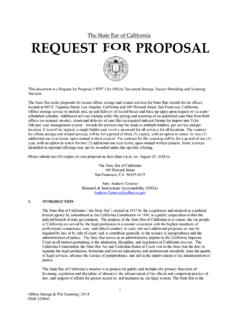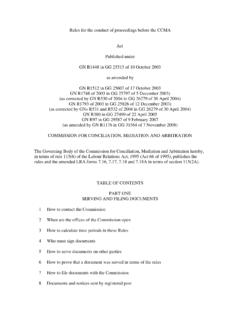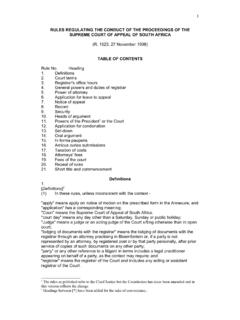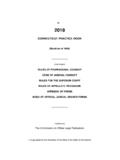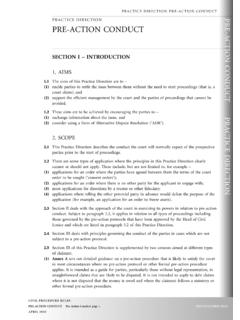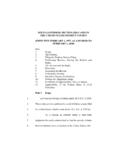Transcription of RULES OF PROFESSIONAL CONDUCT - State Bar of …
1 2017 i RULES OF PROFESSIONAL CONDUCT CHAPTER 1. PROFESSIONAL INTEGRITY IN GENERAL Rule 1-100 RULES of PROFESSIONAL CONDUCT , in General 1 Rule 1-110 Disciplinary Authority of the State Bar 2 Rule 1-120 Assisting, Soliciting, or Inducing Violations 2 Rule 1-200 False Statement Regarding Admission to the State Bar 2 Rule 1-300 Unauthorized Practice of Law 2 Rule 1-310 Forming a Partnership With a Non-Lawyer 3 Rule 1-311 Employment of Disbarred, Suspended, Resigned, or Involuntarily Inactive Member 3 Rule 1-320 Financial Arrangements With Non-Lawyers 4 Rule 1-400 Advertising and Solicitation 5 Rule 1-500 Agreements Restricting a Member s Practice 7 Rule 1-600 Legal Service Programs 8 Rule 1-650 Limited Legal Services Programs 8 Rule 1-700 Member as Candidate for Judicial Office 9 Rule 1-710 Member as Temporary Judge, Referee, or Court-Appointed Arbitrator 9 CHAPTER 2. RELATIONSHIP AMONG MEMBERS Rule 2-100 Communication With a Represented Party 10 Rule 2-200 Financial Arrangements Among Lawyers 10 Rule 2-300 Sale or Purchase of a Law Practice of a Member, Living or Deceased 11 Rule 2-400 Prohibited Discriminatory CONDUCT in a Law Practice 12 CHAPTER 3.
2 PROFESSIONAL RELATIONSHIP WITH CLIENTS Rule 3-100 Confidential Information of a Client 13 Rule 3-110 Failing to Act Competently 16 Rule 3-120 Sexual Relations With Client 16 Rule 3-200 Prohibited Objectives of Employment 17 Rule 3-210 Advising the Violation of Law 17 Rule 3-300 Avoiding Interests Adverse to a Client 18 Rule 3-310 Avoiding the Representation of Adverse Interests 18 Rule 3-320 Relationship With Other Party s Lawyer 20 Rule 3-400 Limiting Liability to Client 20 Rule 3-410 Disclosure of PROFESSIONAL Liability Insurance 20 Rule 3-500 Communication 21 Rule 3-510 Communication of Settlement Offer 22 Rule 3-600 Organization as Client 22 Rule 3-700 Termination of Employment 23 CHAPTER 4. FINANCIAL RELATIONSHIP WITH CLIENTS Rule 4-100 Preserving Identity of Funds and Property of a Client 24 Rule 4-200 Fees for Legal Services 26 ii 2017 Rule 4-210 Payment of Personal or Business Expenses Incurred by or for a Client 26 Rule 4-300 Purchasing Property at a Foreclosure or a Sale Subject to Judicial Review 26 Rule 4-400 Gifts From Client 27 CHAPTER 5.
3 ADVOCACY AND REPRESENTATION Rule 5-100 Threatening Criminal, Administrative, or Disciplinary Charges 27 Rule 5-110 Special Responsibilities of a Prosecutor 27 Rule 5-120 Trial Publicity 29 Rule 5-200 Trial CONDUCT 30 Rule 5-210 Member as Witness 30 Rule 5-220 Suppression of Evidence 30 Rule 5-300 Contact With Officials 30 Rule 5-310 Prohibited Contact With Witnesses 31 Rule 5-320 Contact With Jurors 31 CALIFORNIA RULES OF PROFESSIONAL CONDUCT 2017 CURRENT RULES 1 (Current RULES as of November 2, 2017. The operative dates of select rule amendments are shown at the end of relevant RULES .) CALIFORNIA RULES OF PROFESSIONAL CONDUCT CHAPTER 1. PROFESSIONAL INTEGRITY IN GENERAL Rule 1-100 RULES of PROFESSIONAL CONDUCT , in General (A) Purpose and Function. The following RULES are intended to regulate PROFESSIONAL CONDUCT of members of the State Bar through discipline. They have been adopted by the Board of Governors of the State Bar of California and approved by the Supreme Court of California pursuant to Business and Professions Code sections 6076 and 6077 to protect the public and to promote respect and confidence in the legal profession.
4 These RULES together with any standards adopted by the Board of Governors pursuant to these RULES shall be binding upon all members of the State Bar. For a willful breach of any of these RULES , the Board of Governors has the power to discipline members as provided by law. The prohibition of certain CONDUCT in these RULES is not exclusive. Members are also bound by applicable law including the State Bar Act (Bus. & Prof. Code, 6000 et seq.) and opinions of California courts. Although not binding, opinions of ethics committees in California should be consulted by members for guidance on proper PROFESSIONAL CONDUCT . Ethics opinions and RULES and standards promulgated by other jurisdictions and bar associations may also be considered. These RULES are not intended to create new civil causes of action. Nothing in these RULES shall be deemed to create, augment, diminish, or eliminate any substantive legal duty of lawyers or the non-disciplinary consequences of violating such a duty.
5 (B) Definitions. (1) Law Firm means: (a) two or more lawyers whose activities constitute the practice of law, and who share its profits, expenses, and liabilities; or (b) a law corporation which employs more than one lawyer; or (c) a division, department, office, or group within a business entity, which includes more than one lawyer who performs legal services for the business entity; or (d) a publicly funded entity which employs more than one lawyer to perform legal services. (2) Member means a member of the State Bar of California. (3) Lawyer means a member of the State Bar of California or a person who is admitted in good standing of and eligible to practice before the bar of any United States court or the highest court of the District of Columbia or any State , territory, or insular possession of the United States, or is licensed to practice law in, or is admitted in good standing and eligible to practice before the bar of the highest court of, a foreign country or any political subdivision thereof.
6 (4) Associate means an employee or fellow employee who is employed as a lawyer. (5) Shareholder means a shareholder in a PROFESSIONAL corporation pursuant to Business and Professions Code section 6160 et seq. (C) Purpose of Discussions. Because it is a practical impossibility to convey in black letter form all of the nuances of these disciplinary RULES , the comments contained in the Discussions of the RULES , while they do not add independent basis for imposing discipline, are intended to provide guidance for interpreting the RULES and practicing in compliance with them. (D) Geographic Scope of RULES . (1) As to members: These RULES shall govern the activities of members in and outside this State , except as members lawfully practicing outside this State may be specifically required by a jurisdiction in which they are practicing to follow RULES of PROFESSIONAL CONDUCT different from these RULES .
7 RULES OF PROFESSIONAL CONDUCT 2 CURRENT RULES 2017 (2) As to lawyers from other jurisdictions who are not members: These RULES shall also govern the activities of lawyers while engaged in the performance of lawyer functions in this State ; but nothing contained in these RULES shall be deemed to authorize the performance of such functions by such persons in this State except as otherwise permitted by law. (E) These RULES may be cited and referred to as RULES of PROFESSIONAL CONDUCT of the State Bar of California. Discussion: The RULES of PROFESSIONAL CONDUCT are intended to establish the standards for members for purposes of discipline. (See Ames v. State Bar (1973) 8 910 [106 489].) The fact that a member has engaged in CONDUCT that may be contrary to these RULES does not automatically give rise to a civil cause of action.
8 (See Noble v. Sears, Roebuck & Co. (1973) 33 654 [109 269]; Wilhelm v. Pray, Price, Williams & Russell (1986) 186 1324 [231 355].) These RULES are not intended to supercede existing law relating to members in non-disciplinary contexts. (See, , Klemm v. Superior Court (1977) 75 893 [142 509] (motion for disqualification of counsel due to a conflict of interest); Academy of California Optometrists, Inc. v. Superior Court (1975) 51 999 [124 668] (duty to return client files); Chronometrics, Inc. v. Sysgen, Inc. (1980) 110 597 [168 196] (disqualification of member appropriate remedy for improper communication with adverse party).) Law firm, as defined by subparagraph (B)(1), is not intended to include an association of lawyers who do not share profits, expenses, and liabilities.
9 The subparagraph is not intended to imply that a law firm may include a person who is not a member in violation of the law governing the unauthorized practice of law. (Amended by order of the Supreme Court, operative September 14, 1992.) [Publisher s Note re Rule 1-100(A): Operative January 1, 2012, Business and Professions Code section 6010, in part, provides that the State Bar is governed by a board known as the board of trustees of the State Bar and that any provision of law referring to the board of governors shall be deemed to refer to the board of trustees. In accordance with this law, references to the board of governors included in the current RULES of PROFESSIONAL CONDUCT are deemed to refer to the board of trustees. ] Rule 1-110 Disciplinary Authority of the State Bar A member shall comply with conditions attached to public or private reprovals or other discipline administered by the State Bar pursuant to Business and Professions Code sections 6077 and 6078 and rule , California RULES of Court.
10 (Amended by order of the Supreme Court, operative July 11, 2008.) Rule 1-120 Assisting, Soliciting, or Inducing Violations A member shall not knowingly assist in, solicit, or induce any violation of these RULES or the State Bar Act. Rule 1-200 False Statement Regarding Admission to the State Bar (A) A member shall not knowingly make a false statement regarding a material fact or knowingly fail to disclose a material fact in connection with an application for admission to the State Bar. (B) A member shall not further an application for admission to the State Bar of a person whom the member knows to be unqualified in respect to character, education, or other relevant attributes. (C) This rule shall not prevent a member from serving as counsel of record for an applicant for admission to practice in proceedings related to such admission. Discussion: For purposes of rule 1-200 admission includes readmission.
